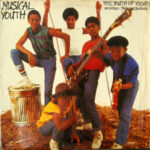 “Iko Iko,” with its infectious rhythm and evocative lyrics, has transcended generations, genres, and geographies, becoming one of the most frequently covered songs in music history. From its roots in New Orleans Mardi Gras traditions to its adoption by global pop icons, “Iko Iko” has maintained an enduring appeal that continues to captivate listeners. This article explores the journey of the song, tracing its origins, its cultural significance, and the many artists who have reinterpreted it, from The Dixie Cups and Dr. John to the Grateful Dead and beyond.
“Iko Iko,” with its infectious rhythm and evocative lyrics, has transcended generations, genres, and geographies, becoming one of the most frequently covered songs in music history. From its roots in New Orleans Mardi Gras traditions to its adoption by global pop icons, “Iko Iko” has maintained an enduring appeal that continues to captivate listeners. This article explores the journey of the song, tracing its origins, its cultural significance, and the many artists who have reinterpreted it, from The Dixie Cups and Dr. John to the Grateful Dead and beyond.
The Origins of “Iko Iko”
“Iko Iko” began its life as “Jock-A-Mo,” a song written and recorded by James “Sugar Boy” Crawford in 1953. Drawing inspiration from the chants and rituals of New Orleans’ Mardi Gras Indians, the song featured a rhythmic, hypnotic melody and cryptic lyrics that reflected the Creole language and cultural heritage of the region. Crawford’s version, however, was a modest regional hit and did not immediately achieve widespread acclaim. Yet, its infectious spirit and cultural authenticity laid the foundation for what would become a global phenomenon.
In 1965, The Dixie Cups, a New Orleans-based girl group, brought “Iko Iko” into the mainstream. During a recording session, the group began to improvise the song—using drumsticks and ashtrays to create a percussive rhythm—and inadvertently created a new version that would captivate audiences worldwide. Their rendition, stripped down and spontaneous, reached number 20 on the Billboard Hot 100. The Dixie Cups’ “Iko Iko” transformed the song from a regional chant into an international hit, showcasing the power of simplicity and authenticity in music.
Dr. John and the Mystique of New Orleans
Dr. John, a legendary figure in New Orleans music, contributed to the legacy of “Iko Iko” with his own interpretation. Known for his swampy, voodoo-infused sound, Dr. John’s rendition of “Iko Iko” emphasized the song’s roots in the cultural mystique of New Orleans. His gravelly vocals and distinctive piano playing brought a darker, more soulful dimension to the song, reflecting the depth and complexity of the traditions it represented. Dr. John’s version not only celebrated the song’s origins but also introduced it to a broader audience of rock and blues enthusiasts.
The Grateful Dead’s Embrace of “Iko Iko”
The Grateful Dead, known for their eclectic repertoire and improvisational style, incorporated “Iko Iko” into their live performances, further cementing its status as a cultural touchstone. For the Dead, the song’s celebratory and communal nature made it a perfect addition to their setlists. Their version, often extended with improvised jams, became a fan favorite at concerts, showcasing the song’s adaptability to the band’s freeform approach.
The Grateful Dead’s embrace of “Iko Iko” also highlighted its universality. Though rooted in the specific cultural traditions of New Orleans, the song’s themes of joy, rivalry, and celebration resonated with audiences far beyond its original context. The Dead’s performances of “Iko Iko” became emblematic of their ability to bridge diverse musical styles and cultural influences, bringing the spirit of New Orleans to their global fanbase.
A Song for Every Genre
One of the most remarkable aspects of “Iko Iko” is its versatility. Over the decades, artists from a wide range of genres have put their own spin on the song, demonstrating its adaptability and universal appeal. Pop artists like Cyndi Lauper infused it with playful energy, while reggae musicians like Zap Mama brought a global perspective to its rhythms. Each rendition, while unique, retained the core essence of the song—a testament to its enduring power.
The Belle Stars, a British all-female band, revitalized “Iko Iko” in the 1980s with a new wave twist. Their version, featured in the film “Rain Man,” introduced the song to a new generation of listeners. Meanwhile, country artists and folk musicians have also embraced “Iko Iko,” finding in its simple structure and evocative lyrics a canvas for their own interpretations. The song’s ability to transcend genres speaks to its inherent flexibility and the richness of its cultural roots.
“Iko Iko” in Film and Media
The ubiquity of “Iko Iko” extends beyond music, as it has become a staple in film, television, and advertising. Its inclusion in iconic movies like “Rain Man” and “Mission: Impossible 2” introduced it to diverse audiences, further solidifying its status as a cultural touchstone. The song’s infectious rhythm and celebratory spirit make it a natural choice for scenes of joy and festivity, while its cultural heritage adds depth and authenticity to any project.
Television shows and commercials have also embraced “Iko Iko,” using it to evoke a sense of fun and nostalgia. From Mardi Gras-themed episodes to global marketing campaigns, the song’s adaptability and recognizability ensure its continued presence in popular culture.
Why “Iko Iko” Endures
The enduring appeal of “Iko Iko” lies in its ability to evoke both the specific cultural traditions of New Orleans and universal themes of celebration and community. Its simple, repetitive structure makes it accessible, while its rich cultural heritage gives it depth and authenticity. The song’s cryptic lyrics, rooted in Creole language and Mardi Gras Indian chants, add an element of mystery that invites interpretation and reinvention.
For artists, “Iko Iko” offers a blank canvas. Its minimalist framework allows for endless reinterpretation, from stripped-down acoustic versions to elaborate, genre-defying arrangements. This adaptability ensures that the song remains relevant, resonating with each new generation of listeners and performers.
Conclusion: A Song That Transcends Time
“Iko Iko” is more than just a song—it is a cultural artifact, a celebration of New Orleans heritage, and a testament to the power of music to connect people across time and place. From The Dixie Cups and Dr. John to the Grateful Dead and countless others, each artist who has covered “Iko Iko” has added their voice to a rich and ongoing tradition. As new generations discover and reinterpret the song, its legacy continues to grow, ensuring that “Iko Iko” remains a beloved and enduring part of our collective musical heritage.
This post has already been read 126 times!









